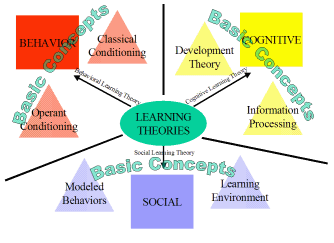
Behavioral Learning Theory - Web Quest

- Behavioral Theory
- Introduction
- Task
- Process
- Resources
- Evaluation
- Conclusion
- Cognitive Theory
- Social Learning Theory
Conclusion
Reflection
The behaviorist theory of instruction and learning is based solely on a change in behavior. Behaviorists do not measure understanding because they do not feel that mental capacity can be measured. They agree that behavior can be learned through a series of stimuli and responses. The Classical Conditioning Theorists lean towards a stimulus first, followed by a response. This pattern is repeated as often as necessary to achieve the desired behavior change. The Operant Conditioning Theorists believe that a desired behavior can be achieved by a use of reinforcers. There are different types of reinforcers and schedules of reinforcement, which can affect a change in behavior.
I believe that the Operant Conditioning theory is more plausible from an instructional standpoint. The Classical Conditioning theory is, in my opinion, too basic. It can be easily shown how a program of reinforcers can, in fact, change behavior. Parents will often use these techniques in teaching their children how to behave. We can also observe the reinforcing motivation of classroom rewards and grades.
References
Nobel e-Museum. "Ivan Pavlov - Biography". (Last updated June 27, 2003) http://www.nobel.se/medicine/laureates/1904/pavlov-bio.html (October 6, 2003).
PBS: A Science Odyssey. "People and Discoveries". (1998) http://www.pbs.org/wgbh/aso/databank/entries/bhpavl.html (October 6, 2003).
University of Texas. "Edward L. Thorndike". http://www.cwrl.utexas.edu/~tonya/309m/class/paper4/bowser/elt.htm (October 6, 2003).
A2zpsychology dot com. "Great Psychologists". http://www.a2zpsychology.com/great psychologists/great_psychologists.htm (October 6, 2003).
C. George Boeree. "Personality Theories". (1998) http://www.ship.edu/~cgboeree/skinner.html (October 6, 2003).
West Virginia University. "Classical Conditioning". (Updated September 15, 1996). http://www.as.wvu.edu/~sbb/comm221/chapters/pavlov.htm (October 6, 2003).
